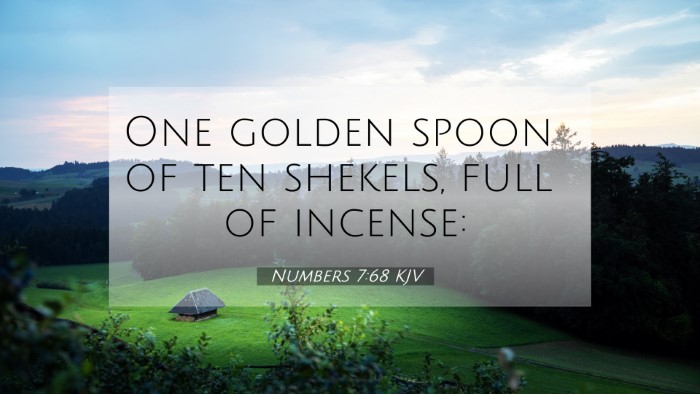Bible Verse Meaning: Numbers 7:68
Verse Context: Numbers 7:68 is situated within a detailed account of the offerings made by the leaders of Israel during the dedication of the Tabernacle. This particular verse notes the contribution brought by the tribe of Zebulun, emphasizing the participation of all tribes in honoring God.
Summary of Insights
Matthew Henry Commentary: Henry highlights the significance of the offerings as a means of expressing devotion and worship to God. Each tribe's offering is indicative of their acknowledgment of God’s provision and sovereignty. The act of bringing forth gifts underscores the importance of communal participation in religious practices.
Albert Barnes Commentary: Barnes elucidates that the offerings signify not just material contributions but also a representation of the spiritual state of Israel. The specifics of each tribe’s offering suggest that God regards every individual contribution and the collective effort towards His worship.
Adam Clarke Commentary: Clarke emphasizes that these offerings were made willingly, demonstrating the people's gratitude and a desire to maintain their covenant with God. He notes the orderly nature of the offerings, suggesting they were not mere ritual but borne from a sincere heart.
Connections to Other Bible Verses
Understanding Numbers 7:68 can be enhanced through various Bible verse cross-references. Here are some related verses:
- Exodus 35:5: Calls for contributions for the Tabernacle, linking the act of offering with communal worship.
- Leviticus 22:29: Discusses the offerings to be accepted, establishing the purity and intention behind sacrificial practices.
- 2 Corinthians 9:7: Emphasizes the importance of cheerful giving, correlating with the spirit in which Israelites approached their offerings.
- Proverbs 3:9: Encourages honoring the Lord with substance, connecting to the intent of dedication inherent in Numbers 7:68.
- Philippians 4:18: Paul discusses his gratitude for the gifts from the Philippians, showing continuity in the principle of offering.
- Romans 12:1: Advocates for presenting oneself as a living sacrifice, reflecting the heart of worship that offerings represent.
- Matthew 5:23-24: Suggested reconciliation before offering, indicating relational aspects of worship that God values.
- Hebrews 13:16: Encourages doing good and sharing, highlighting the ongoing nature of offerings in the community of faith.
- Malachi 3:10: Talks about bringing the full tithe into the storehouse, encouraging faithfulness in offerings like those shared in Numbers.
- Genesis 14:18-20: Describes Abraham giving a tithe, demonstrating that the concept of offerings precedes the Mosaic Law and underlines its ongoing importance.
Thematic Connections Through Cross-Referencing
Numbers 7:68 not only highlights offerings but also aligns with themes of:
- Worship: The necessity of acknowledging God through tangible means.
- Community: The collective responsibility of Israel in worshiping God.
- Sacrifice: The principle of giving up something valuable to honor God.
- Obedience: Following God's commands closely in their practices of worship.
Conclusion
Numbers 7:68 serves as a rich verse for both theological reflection and practical application in the life of believers today. The connections it makes through cross-referencing with other scriptures provide a deeper understanding of God's expectations regarding worship and community involvement. By studying these inter-Biblical dialogues, one can see a coherent narrative of God’s desire for relational engagement through worship across both the Old and New Testaments.
For anyone seeking tools for Bible cross-referencing, learning to identify connections can enhance your understanding of scriptural themes. Invest time in comparative Bible verse analysis to explore the richness of biblical texts and deepen your study of God's Word.


